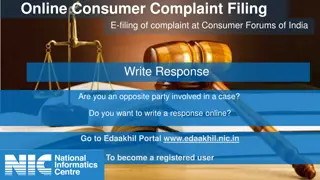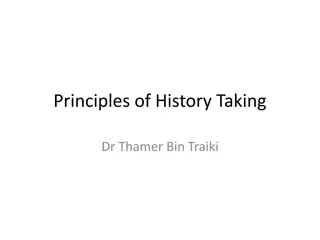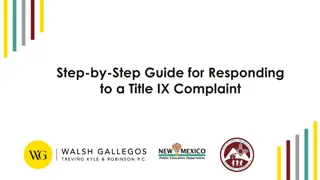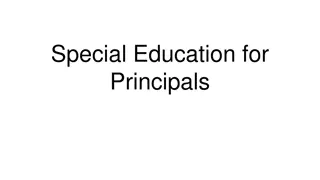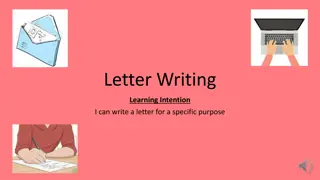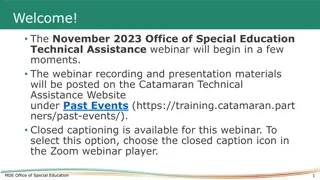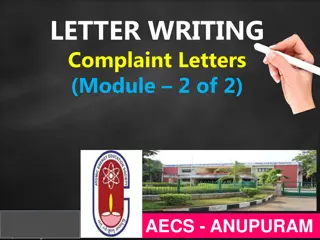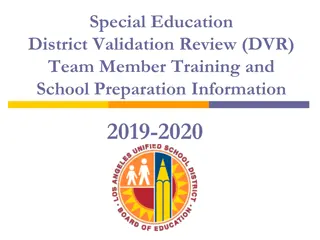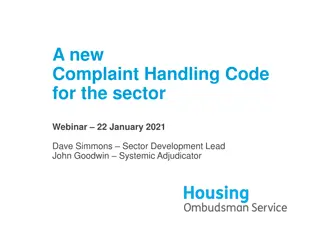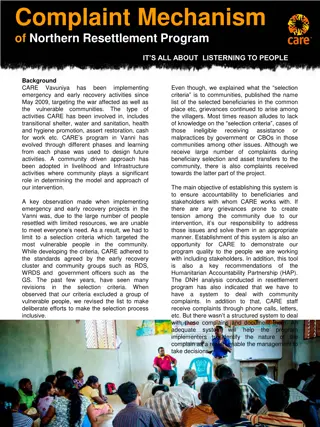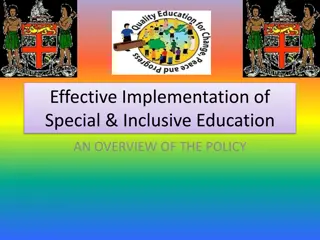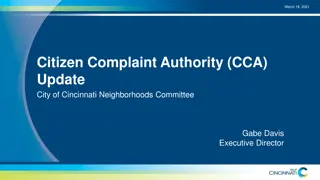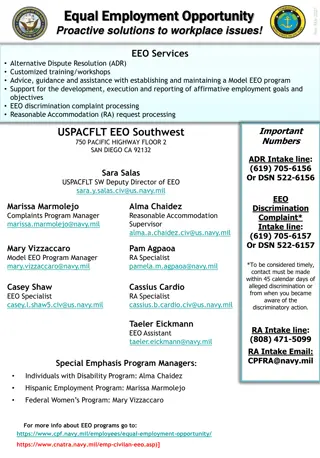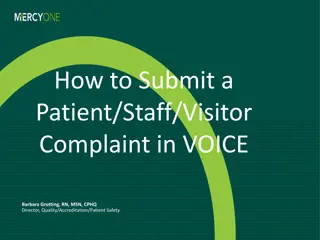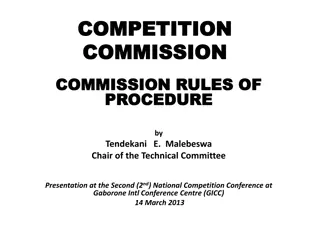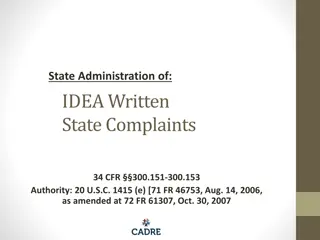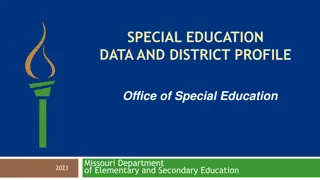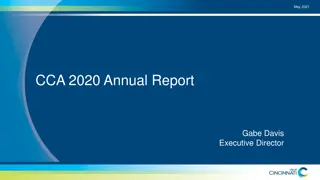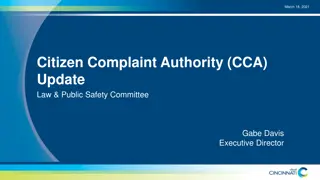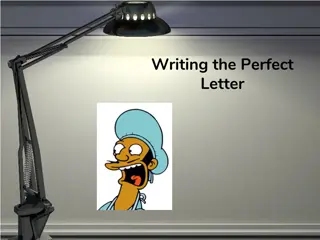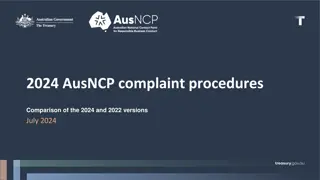Special Education State Complaint Procedures Overview
Explore the procedural safeguards, state complaint procedures, mediation, and due process in special education as outlined by the U.S. Department of Education. Learn about filing complaints, required content, and who can file a complaint. Get insights into the resolution process, surrogate parents, notice, and parent consent, ensuring compliance with Part B of IDEA.
Download Presentation

Please find below an Image/Link to download the presentation.
The content on the website is provided AS IS for your information and personal use only. It may not be sold, licensed, or shared on other websites without obtaining consent from the author. Download presentation by click this link. If you encounter any issues during the download, it is possible that the publisher has removed the file from their server.
E N D
Presentation Transcript
Procedural Safeguards State Complaints, Mediation, Due Process Procedures, and the Resolution Process U.S. Department of Education Office of Special Education Programs
Topic Briefs (TB) A Resolution Meetings and Due Process Hearings B Mediation C State Complaint Procedures D Surrogate Parents, Notice & Parent Consent U.S. Department of Education Office of Special Education Programs 2
Regulation Day means a calendar day unless otherwise indicated as a business day or school day 34 CFR 300.11(a) U.S. Department of Education Office of Special Education Programs 3
State Complaint Procedures U.S. Department of Education Office of Special Education Programs 4
State Complaint Procedures (TBC 3-5) State Complaint A signed, written document submitted to a state educational agency (SEA) by an individual or organization that alleges that a public agency has violated a requirement of Part B of IDEA U.S. Department of Education Office of Special Education Programs 5
State Complaint Procedures (TBC 1-1) Who can file a complaint? Not only may a child s parent file a State complaint, but any organization or individual may file a signed, written complaint with the SEA U.S. Department of Education Office of Special Education Programs 6
State Complaint Procedures Required Content (TBC 3-5) A statement that the public agency has violated a requirement of Part B of the IDEA or of Part 300 of the IDEA regulations The facts on which the statement is based The signature and contact information for the complainant U.S. Department of Education Office of Special Education Programs 7
State Complaint Procedures (TBC 3-5) If alleging violations with respect to a particular child Child s name and address (if the child is homeless, available contact information for the child and name of the child s school) Name of the school the child is attending U.S. Department of Education Office of Special Education Programs 8
State Complaint Procedures (TBC 3-5) Description of the nature of the problem, including facts relating to the problem Proposed resolution of the problem, if known 34 CFR 300.153(b) U.S. Department of Education Office of Special Education Programs 9
Regulation (TBC 1-1) Each SEA must adopt written procedures for Widely disseminating to parents and other interested individuals, including parent and training centers, protection and advocacy agencies, independent living centers, and other appropriate entities, the State procedures under 300.151 through 300.153 34 CFR 300.151(a)(2) U.S. Department of Education Office of Special Education Programs 10
State Complaint Procedures (TBC 3-5) The party filing the complaint must also send a copy to the LEA or public agency serving the child at the same time the complaint is filed with the SEA 34 CFR 300.153(d) U.S. Department of Education Office of Special Education Programs 11
Regulation (TBC 3-6) The complaint must allege a violation that occurred not more than one year prior to the date that the complaint is received in accordance with 34 CFR 300.151 34 CFR 300.153(c) U.S. Department of Education Office of Special Education Programs 12
State Complaint Procedures (TBC 2-3) SEA must provide the public agency with the opportunity to respond to the complaint filed with the SEA, including at a minimum: U.S. Department of Education Office of Special Education Programs 13
State Complaint Procedures (TBC 2-3) At the discretion of the public agency, a proposal to resolve the complaint, and An opportunity for a parent who has filed a complaint and the public agency to voluntarily engage in mediation U.S. Department of Education Office of Special Education Programs 14
Mediation U.S. Department of Education Office of Special Education Programs 15
Mediation (TBB 1-1) Mediation a process conducted by a qualified and impartial mediator to resolve a disagreement between a parent and public agency U.S. Department of Education Office of Special Education Programs 16
Regulation (TBB 3-6) Discussions that occur during the mediation process must be confidential and may not be used as evidence in any subsequent due process hearing or civil proceeding of any federal court or state court of a state receiving assistance under Part 300 34 CFR 300.506(b)(7) U.S. Department of Education Office of Special Education Programs 17
Due Process Procedures U.S. Department of Education Office of Special Education Programs 18
Due Process Procedures Due Process Complaint a document filed by a parent or a public agency to initiate an impartial due process hearing on matters relating to the identification, evaluation, or educational placement of a child with a disability, or the provision of a free appropriate public education (FAPE) to the child U.S. Department of Education Office of Special Education Programs 19
Due Process Complaints (TBA 1-1) Who may file a due process complaint? A parent or public agency may file a due process complaint on issues relating to the identification, evaluation, or educational placement or provision of FAPE 34 CFR 300.507(a) U.S. Department of Education Office of Special Education Programs 20
Due Process Procedures (TBA 2-2) The party filing a due process complaint must provide a copy to the other party and forward a copy to the SEA U.S. Department of Education Office of Special Education Programs 21
Required Notice (TBA 2-2) Specific information must be included in a due process complaint The due process complaint is deemed sufficient unless the party receiving the notice, challenges the sufficiency U.S. Department of Education Office of Special Education Programs 22
Regulation (TBA 3-3) A party may amend its due process complaint only if i. The other party consents in writing to the amendment and is given the opportunity to resolve the due process complaint through a meeting held pursuant to 300.510; or ii. The hearing officer grants permission, except that the hearing officer may only grant permission to amend at any time not later than five days before the due process hearing begins 34 CFR 300.508(d)(3) U.S. Department of Education Office of Special Education Programs 23
Regulation (TBA 3-3) If a party files an amended due process complaint, the timelines for the resolution meeting in 34 CFR 300.510(a) and the time period to resolve in 34 CFR 300.510(b) begin again with the filing of the amended due process complaint 34 CFR 300.508(d)(4) U.S. Department of Education Office of Special Education Programs 24
Resolution Process U.S. Department of Education Office of Special Education Programs 25
Resolution Meeting (TBA 4-4) Resolution Meeting a meeting convened by the local educational agency (LEA), with the parent(s) and other relevant member(s) of the individualized education program (IEP) Team who have specific knowledge of the facts in the parent s due process complaint U.S. Department of Education Office of Special Education Programs 26
Resolution Meeting (cont.) (TBA 4-4) The purpose is for the parent to discuss the due process complaint, and the facts that form its basis so that the LEA has the opportunity to resolve the dispute that forms the basis of the due process complaint U.S. Department of Education Office of Special Education Programs 27
Resolution Process in Brief (TBA 4-4; 4-5) Within 15 days of receipt of a due process complaint, the public agency must convene a resolution meeting If the dispute is not resolved within 30 days of the public agency s receipt of the due process complaint, the due process hearing timeline begins U.S. Department of Education Office of Special Education Programs 28
Resolution Process in Brief (cont.) (TBA 4-4) Parties can agree to mediation as an alternative to the resolution process Parties can agree to waive the resolution process U.S. Department of Education Office of Special Education Programs 29
Regulation (TBA 4-5) If the LEA is unable to obtain the participation of the parent in the resolution meeting after reasonable efforts have been made (and documented using the procedures in 34 CFR 300.322(d)), the LEA may, at the conclusion of the 30-day period, request that a hearing officer dismiss the parent s due process complaint 34 CFR 300.510(b)(4) U.S. Department of Education Office of Special Education Programs 30
Regulation (TBA 4-5) If the LEA fails to hold the resolution meeting within 15 days of receiving notice of a parent s due process complaint or fails to participate in the resolution meeting, the parent may seek the intervention of a hearing officer to begin the due process hearing timeline 34 CFR 300.510(b)(5) U.S. Department of Education Office of Special Education Programs 31
Preview of Coming Attraction The IDEA curriculum is being developed by NICHCY and is available through the http://sites.ed.gov/idea Web site Designed as a trainer of trainers tool, the slides are targeted to a variety of audiences, including school staff, parents, advocates and others interested in IDEA U.S. Department of Education Office of Special Education Programs 32
Web Resources Consortium for Appropriate Dispute Resolution in Special Education (CADRE): http://www.directionservice.org/cadre OSEP s IDEA website: http://sites.ed.gov/idea U.S. Department of Education Office of Special Education Programs 33
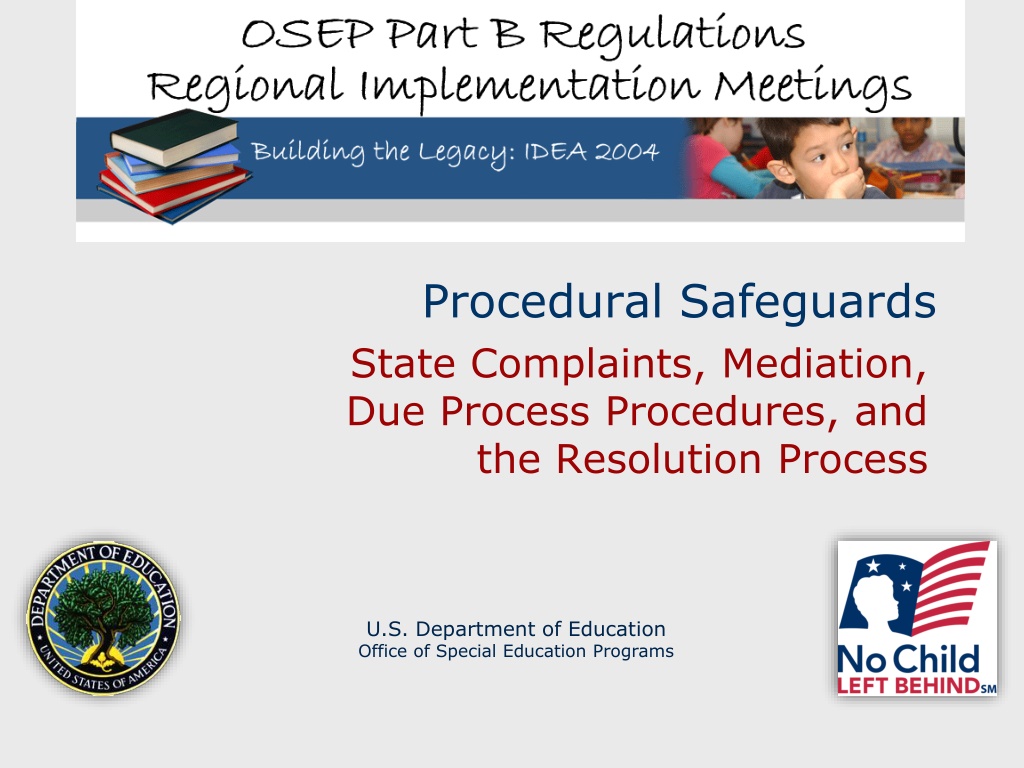
 undefined
undefined



